Have you ever noticed birds chirping and pecking in your gutters? Well, you’re not the only one to notice that. One peculiar habit observed in some bird species is their tendency to clean out gutters.
While it may seem puzzling at first, there are several reasons why birds clean out gutters. Birds go into gutters primarily to collect nesting materials and food. Sometimes they look for water and clean themselves in the gutters.
In rare cases, the birds clean gutters to mark their territories.
Let’s dive in and discover why birds clean gutters, why it’s terrible, and how to prevent it.
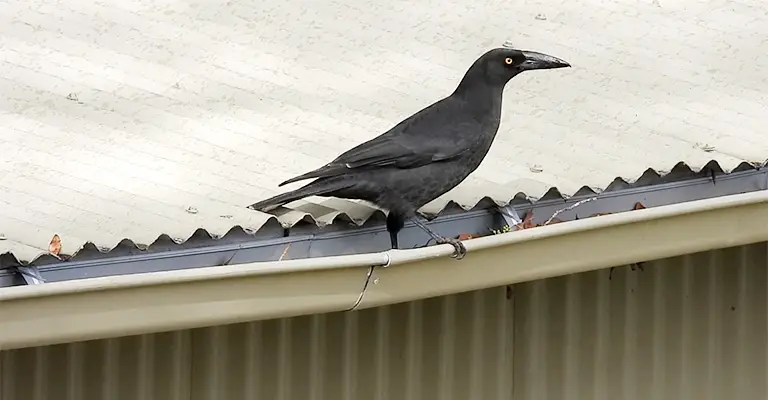
5 Reasons Why Birds Clean Out Gutters
Not all birds get into the gutters and make a habitat inside them. Few species often clean out gutters for food and the best building materials. However, there are other reasons too.
Here’s why birds tend to clean out gutters-
Nesting Material Collection
One of the primary reasons birds clean out gutters is to gather materials for nest construction. Gutters often accumulate twigs, leaves, and other debris that can serve as suitable building materials for birds.
By removing these items, birds ensure a clean and secure location for their nests. They provide birds with an ideal spot to build their nests, protecting them from predators and adverse weather conditions.
Food Source Exploration
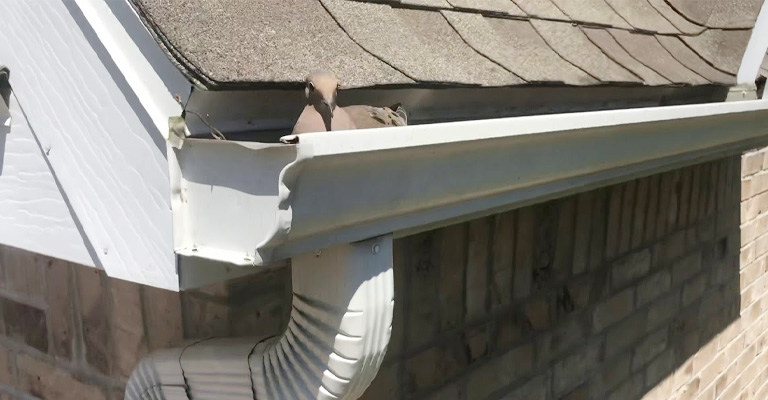
Gutters can act as a treasure trove of food for certain bird species. They often contain an assortment of insects, small invertebrates, and organic matter that attract birds searching for a quick meal.
Birds such as robins, sparrows, and swallows are known to probe gutters with their beaks, using their keen eyesight and dexterity to extract edible morsels. The gutter becomes a natural buffet with a convenient and abundant food source for these birds.
Water Collection
In regions where water sources may be scarce or inaccessible, birds may turn to gutters as a vital source of hydration. Gutters can accumulate rainwater or dew, providing birds with a readily available water supply.
As they clean out the gutters, birds access this precious resource, enabling them to quench their thirst during dry spells. This behavior showcases the remarkable adaptability of birds in utilizing unconventional sources to meet their basic needs.
Territory Marking
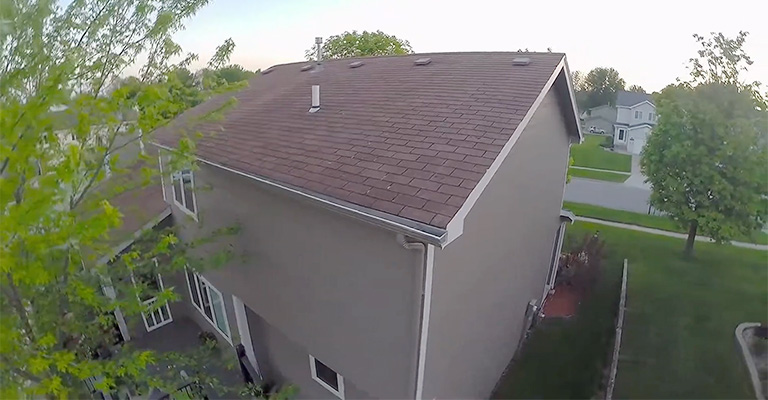
Birds are territorial creatures that mark their presence in various ways. Cleaning out gutters can serve as territorial marking, indicating that a particular bird or bird pair claims the area as their own.
By actively maintaining and tidying up the gutters, birds message other birds that this territory is occupied.
This behavior helps to establish and defend their breeding grounds, ensuring the survival of their offspring.
Self-Maintenance and Grooming
Birds are meticulous when it comes to personal hygiene. Cleaning out gutters can contribute to their self-maintenance routine by helping them remove dirt, dust, and parasites from their feathers.
The debris found in gutters may include small particles that birds can use to rid themselves of unwanted hitchhikers or to maintain the quality and condition of their plumage. By engaging in this behavior, birds remain healthy, presentable, and capable of efficient flight.
Are Birds Cleaning Out Gutters Bad?
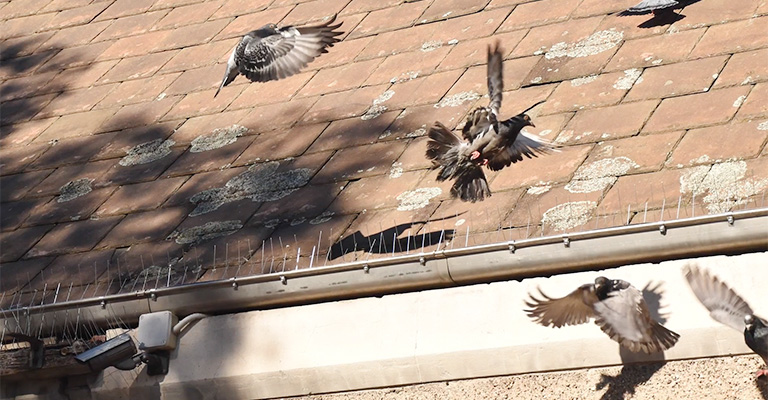
Now that we understand why birds clean out gutters, let’s address the consequences. Is it bad or good that birds are cleaning out gutters?
The answer is not a straightforward yes or no. While birds cleaning out gutters can have some advantages, there are potential downsides. If bird activity in gutters becomes excessive, it may lead to clogs and blockages, which can impede the proper flow of water.
This can result in water overflowing from the gutters, potentially causing damage to the building’s exterior, walls, or foundation. Additionally, bird droppings can accumulate in gutters, leading to unsightly stains and potential health concerns.
Also, having birds in gutters can necessitate more frequent cleaning and maintenance. It will lead to additional costs and time spent on gutter upkeep.
How to Prevent Birds from Cleaning Out Gutters?
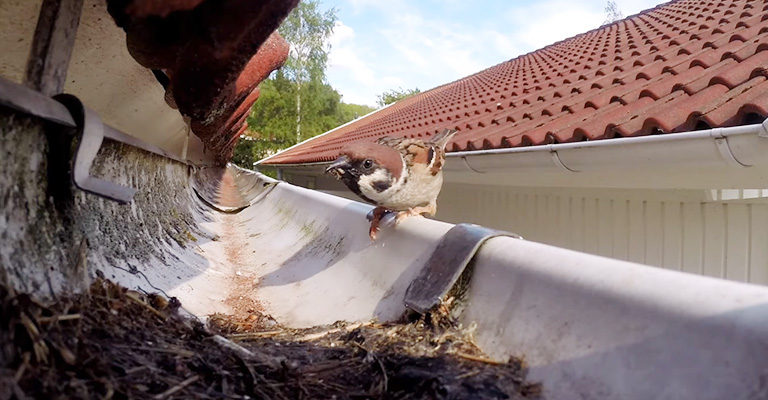
To prevent birds from getting into gutters and mitigate the associated problems, here are a few tips-
Install Gutter Guards or Screens
These physical barriers can be placed over gutters, preventing birds from entering and allowing water to flow freely. Gutter guards come in various materials, such as mesh or plastic, and can effectively deter birds while minimizing maintenance requirements.
Scare Tactics
Utilize visual or auditory deterrents to discourage birds from approaching gutters. Reflective objects, such as shiny tape or old CDs, can create flashes of light that birds find unsettling. Ultrasonic devices emit high-frequency sounds unpleasant to birds, deterring them from the area.
Maintain Surrounding Trees and Shrubs:
Trim branches and shrubs near the building to reduce the accessibility of gutters for birds. Eliminating convenient perching spots can make it less appealing for birds to approach the gutters.
Regular Gutter Maintenance:
Keep gutters clean and debris-free to discourage birds from establishing nests or foraging for food. Regularly inspect and clean gutters to prevent clogs and blockages that can attract birds.
Seek Professional Assistance:
If bird activity in gutters becomes a persistent problem, consider consulting with a professional wildlife control service. They can provide expert advice and implement humane solutions tailored to your Situation.
FAQ
Birds clean out gutters primarily to find food. Gutters often collect debris, such as leaves and twigs, which attract insects and other small invertebrates. Birds, especially insect-eating species like sparrows and swallows, are naturally inclined to search for food in such environments.
No, birds do not clean gutters specifically for nesting purposes. While birds may occasionally build nests in gutters if suitable materials are available, their primary motivation for visiting gutters is to feed on the insects and other organisms that thrive in the accumulated debris.
Yes, certain bird species are more inclined to clean gutters due to their foraging habits. Insect-eating birds, such as robins, blackbirds, and starlings, are commonly observed in gutters, diligently searching for insects and larvae. These species have adapted to urban environments and utilize gutters as a reliable food source.
While birds may help reduce the amount of debris in gutters to some extent, their cleaning activity is not as thorough as human intervention. Birds primarily pick out food items rather than specifically removing all debris. Regular gutter maintenance by humans, such as cleaning and clearing, is still necessary to ensure the proper functioning of the gutter system.
Yes, there are benefits to birds cleaning gutters. By foraging for insects and other small organisms in gutters, birds contribute to pest control in the surrounding area. Additionally, the presence of birds in gutters can serve as a reminder for homeowners to maintain their gutter systems and prevent excessive clogging, which can lead to water damage or breeding grounds for pests.
Final Words
So, now you know why birds clean out gutters. From collecting nesting materials to searching for food and maintaining their territories, birds demonstrate resourcefulness and adaptability.
While their presence in gutters can have both benefits and drawbacks, you can take proactive measures to prevent bird access to gutters. It ensures the harmonious coexistence of humans and birds while preserving the integrity of our homes and buildings.
Use gutter guards, scare tactics, or consult professionals. Try different methods to find out what works best for you.